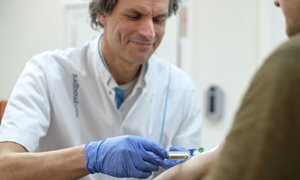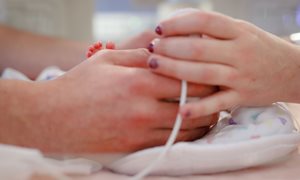
For young children with HIV, there is now an effective and safe drug available that inhibits the infection. Researchers at Radboud university medical center have shown that an existing anti-HIV drug, dolutegravir, is also suitable for children under twenty kilograms body weight, with a paediatric tablet containing a lower dose. The World Health Organization WHO has incorporated the findings into its guidelines.
Worldwide, 1.8 million children under the age of 15 are living with HIV, a virus that, without treatment, can eventually lead to AIDS. This virus attacks the body’s own defenses, making pathogens that would normally be stopped dangerous. A cure is not possible at this time, but when using medication people with HIV can live a long life.
For a long time there was no clear treatment advice for children. Then the ODYSSEY study was started, in which a large group of international scientists searched for the best medication for children. In 2020 this was followed by an advice for children over twenty kilos. Now this advice is also available for smaller children who are living with HIV: those who are at least 4 weeks old and weigh between 3 and 20 kilos. Researchers at Radboud university medical center and others have shown that, in low doses, the drug dolutegravir is easy to use and can safely be prescribed to these children. A special pediatric tablet has been developed by the manufacturer that will also become available in low-income countries. This advice is included in the drug's patient information in Europe and America and in the WHO's treatment guidelines.
Researcher Angela Colbers, together with Radboudumc colleagues Hylke Waalewijn, Pauline Bollen and David Burger is involved in this study: 'The younger children start taking anti-HIV medication, the better, and in low-income countries we aim to make treatment the same for children and adults. In adults, dolutegravir is mainly used, but for children there was no suitable pill available and the dosage was unknown. Now we know that the new pediatric tablet works well and what dosage to use. Babies from four weeks of age who need it can take this medication safely. The drug produces few side effects, it inhibits virus growth quickly and the risk of resistance is low.'
Dolutegravir is one of three medications children take to combat the virus. 'These drugs tackle a different part of the virus, making them collectively an effective combination,' Colbers says. What's more, it's a relatively inexpensive drug that is widely available: from high- to low-income countries, an important starting point for WHO.
Curing the virus is not yet any closer, Colbers explains. 'A lot of work is being done on other treatments and also vaccines, but unfortunately without results yet. The corona crisis has had consequences for the fight against HIV, but hopefully the knowledge gathered from the corona vaccines will also have a positive effect on the development of HIV vaccines. That is not yet the case. That's why I'm happy with this treatment advice for the young patients: so that we can treat them as optimal as possible for now.'
About the publications
This study is an additional part of the ODYSSEY study, the findings of which were published in December 2021 in the international journal New England Journal of Medicine. This also concluded, co-authored by Angela Colbers, that the drug dolutegravir works better in children with HIV than the treatment that was the standard of care at the time.
Publication in The Lancet HIV: Dolutegravir dosing for children with HIV weighing less than 20 kg: pharmacokinetic and safety substudies nested in the open-label, multicentre, randomised, non-inferiority ODYSSEY trial - Hylke Waalewijn, Man K Chan, Pauline D J Bollen, Hilda A Mujuru, Shafic Makumbi, Adeodata R Kekitiinwa, Elizabeth Kaudha, Tatiana Sarfati, Godfrey Musoro, Annet Nanduudu, Abbas Lugemwa, Pauline Amuge, Cecilia L Moore, Pablo Rojo, Carlo Giaquinto, Angela Colbers, Diana M Gibb, Deborah Ford, Anna Turkova, David M Burger, ODYSSEY Trial Team. DOI: https://doi.org/10.1016/S2352-3018(21)00292-7.
-
Want to know more about these subjects? Click on the buttons below for more news.
More information
Pauline Dekhuijzen

wetenschaps- en persvoorlichter
Related news items





